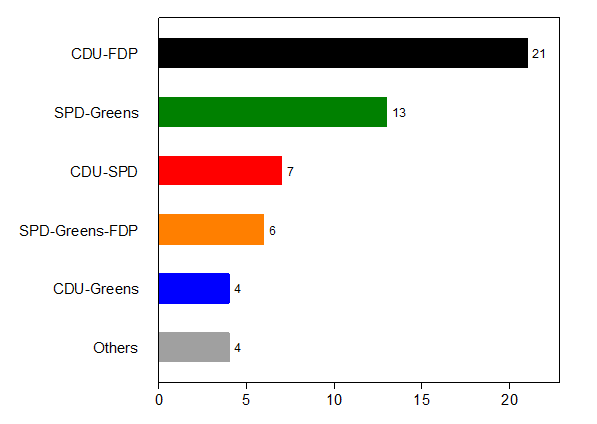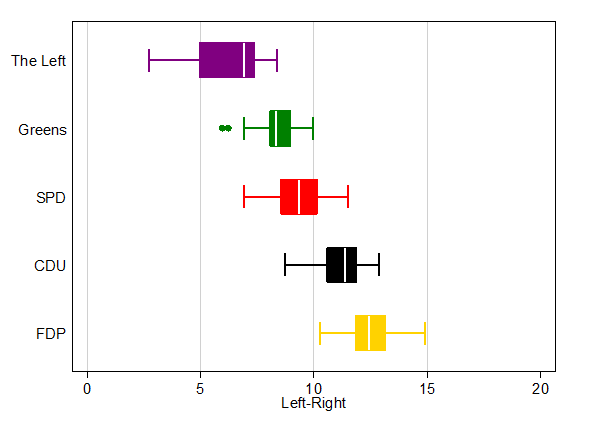Local politicians take the party affiliation of directly elected mayors into account when forming coalitions
The UK now has a number of Directly Elected Local Authority Mayors, as well as the elected Mayor of London. But the extra layer of governance (and accountability) has implications for coalition formation at the local level. Drawing on research carried out in Germany, Martin Gross and Marc Debus argue that local politicians take the party affiliation of directly elected mayors into account when forming coalitions at the local level.

Credit: James Walsh, CC BY NC 2.0
Local politics is often seen as less politicised than politics on the national and regional level. Decision-making is assumed to follow a more pragmatic and consensual path – at least in Germany. This view, however, stands in stark contrast to the notion that political parties increasingly care about their electoral performance on the local level. Large cities in particular are seen as bastions which have to be defended against the attacks of rival parties. There are two ways for parties to “reign” in a city – for one thing having one of the party members being the popularly elected mayor, or that party being in a majority or coalition on the local council. It is the latter that we tackle here, and in a forthcoming article in Party Politics: “Coalition formation at the local level: Institutional constraints, party policy conflict, and office-seeking political parties”.
In our research, we looked at coalition formations in 29 cities with at least 100,000 inhabitants in the German state of North Rhine-Westphalia. North Rhine-Westphalia is the most populous state in Germany with approximately 17.5 million inhabitants. It comes as no surprise that here even local elections are of great importance for national and regional parties. Parties in North Rhine-Westphalia have a much stronger position in local politics vis-à-vis mayors than in other German states because both the mayor and the local council parties shape the local policy agenda. A peculiarity of this semi-presidential institutional setting is the peril of legislative gridlock between the popularly elected mayor and the local council majority, especially in situations where the mayor’s party is not part of the coalition in the local council (a situation which is similar to ‘cohabitation’ in the French political system). Since legislative gridlock is likely to result in frustration among voters, who could punish the responsible parties (the ones forming the coalition and/or the parties supporting the mayor) in any upcoming elections, parties should favour a political constellation that secures an efficient governing process. Consequently, local political actors have an incentive to include the mayor’s party in local council coalitions.
The below table shows how many times political actors in the local council included the mayor’s party in a coalition (defined as a co-operation between at least two parties signing a written agreement) between 1999 and 2009. The overwhelming majority of the 55 coalitions include the mayor’s party. Local political actors indeed try to avoid ‘cohabitation’.
Yet, local coalition formation in a multi-level political system does not take place in the wild. Party groups on the sub-national level may have some leeway in positioning themselves but there would be severe consequences by the national party organisation if they would co-operate with, for instance, extremist parties – or parties which are generally seen as not suited for a coalition on all levels of the political system. Furthermore, it isn’t in parties interest to confuse the public – coalescing with one party on the national or regional level and forming a coalition with another party on the local level could be seen as sending ‘mixed signals’ to voters. The following figure shows the frequency of various coalitions that have been formed in the local councils under study.
Local political actors copy the patterns of coalition formation known from the national and regional level. Almost all of the coalitions are two-party coalitions with a majority in local councils and most of them are formed between parties of the same ideological camp – the Christian Democrats (CDU) with the Free Democratic Party (FDP), and the Social Democrats (SPD) with Alliance ‘90/The Greens.
This is also an evidence for the policy-seeking activity of local political actors – they try to minimize the ideological distance within a coalition by choosing coalition partners of the same ideological camp. The following figure shows that the ideological left-right positions of local parties can be ordered in the same manner as on the national and regional level: the socialist ‘Left’ is located on the left side of the left-right axis and the market-liberal FDP on the right side (we estimated the policy positions by using local parties’ election manifestos and applying the Wordscores approach).
All in all, political actors from the local level follow by and large the same strategies as their fellow politicians acting on superior levels of the political system. Local political actors rather prefer winning coalitions with the smallest number of parties than to form minority coalitions or coalitions including additional parties that are not necessary to obtain a majority. Moreover, coalitions are more likely to form if the ideological distance between parties decreases. Most importantly, local political actors strive to include the party of the directly elected mayor in local council coalitions. The interplay between mayors and council majorities thus is crucial for our understanding of day-to-day local politics – and local politicians apparently act more strategic than we might have thought.
—
This post represents the views of the author, and not those of Democratic Audit or the LSE. Please read our comments policy before posting.
—
Martin Gross is Professor of Political Science at Mannheim University. His full academic profile can be found here.
Marc Debus is Professor of Comparative Government at the University of Mannheim. His full academic profile can be found here.








 Democratic Audit's core funding is provided by the Joseph Rowntree Charitable Trust. Additional funding is provided by the London School of Economics.
Democratic Audit's core funding is provided by the Joseph Rowntree Charitable Trust. Additional funding is provided by the London School of Economics.
RT @AriannaGi: Local politicians in Germany take account of party affiliation of directly elected mayors when forming coalitions | https://t…
Local politicians take party affiliation of elected mayors into account when forming coalitions at the local level https://t.co/HPH1Ea2xXQ
Local politicians take the party affiliation of directly elected mayors into account when forming coalitions https://t.co/pknQpaVTmy
Local politicians in Germany take account of party affiliation of directly elected mayors when forming coalitions | https://t.co/1tGRomAEBn
Local politicians take the party affiliation of directly elected mayors into account when forming coalitions: … https://t.co/f3Ps2GOclq
Local politicians in Germany take account of party affiliation of directly elected mayors when forming coalitions https://t.co/UXHOJ9T84R
Local politicians take the party affiliation of directly elected mayors into account when forming coalitions https://t.co/w6Sov73KEG #Opti…
Local politicians take the party affiliation of directly elected mayors into account when… https://t.co/eyQxiuYB7C https://t.co/nsBc4a9i4E